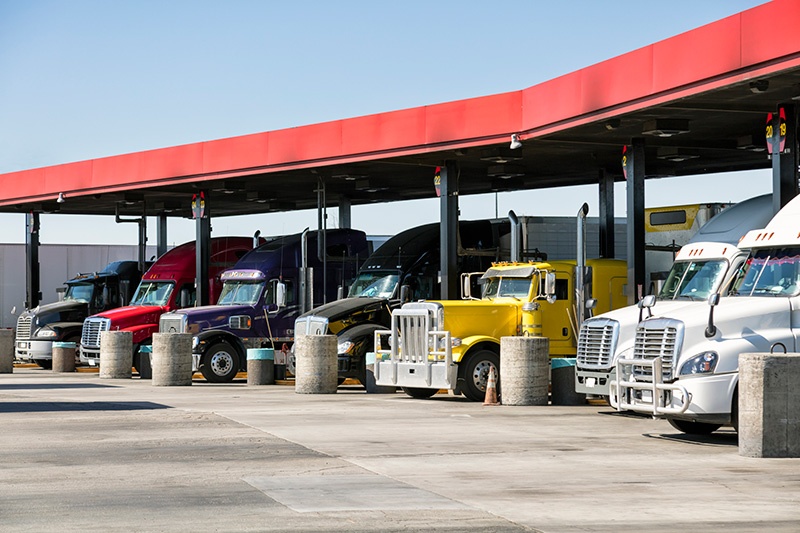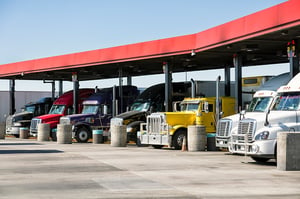Excessive Idling: Are You Spending Fuel Going Nowhere?

 If you’re looking to control costs — and what fleet manager isn’t — finding ways to reduce excessive idling should be one of your top priorities. Excessive idling is a huge fuel waster that gives you zero miles per gallon, increases maintenance costs and produces pollutant emissions that are harmful to the environment and to the health of your drivers. Plus, in many jurisdictions, excessive idling is illegal, with hefty fines for a violation.
If you’re looking to control costs — and what fleet manager isn’t — finding ways to reduce excessive idling should be one of your top priorities. Excessive idling is a huge fuel waster that gives you zero miles per gallon, increases maintenance costs and produces pollutant emissions that are harmful to the environment and to the health of your drivers. Plus, in many jurisdictions, excessive idling is illegal, with hefty fines for a violation.
There are various reasons for drivers allowing an engine to idle, including warming up or cooling down the interior of the vehicle, operating emergency lighting or radios, warming up the engine, powering off-board equipment, processing paperwork, talking on the phone, and loading/unloading.
Whatever the reason, here’s an alarming stat…Each year, according to the U.S. Department of Energy (DOE), light, medium and heavy-duty trucks and passenger vehicles consume more than 6 billion gallons of diesel fuel and gasoline while idling — yes, billion — which represents an enormous amount of fuel spend going nowhere except up in smoke.
A Closer Look at the Cost of Idling for Fleets
The area that excessive idling has the greatest negative impact on for fleets is fuel waste, which can vary depending on the size of the vehicle and the size of the load the vehicle is carrying.
According to a study prepared by Argonne National Laboratory (a DOE laboratory), delivery and medium and heavy-duty Class 6 trucks waste about 0.84 gallons of fuel per hour when idling, medium and heavy-duty diesel trucks 0.44 and tow trucks 0.59.
Considering statics show that many trucks idle between 4 and 8 hours a day, the cost to fleet owners and operators can be as much as $5,000 to $12,000 in wasted fuel costs per truck each year.
In addition to fuel costs, there are also higher maintenance costs associated with excessive idling. An idling engine doesn’t operate at the correct temperature, which causes fuel to burn only partially. This leads to fuel residue buildup that can cause all sorts of expensive and productivity-hindering problems, including damaged engine components such as spark plugs, cylinders and exhaust systems. Cutting back on idling can reverse this. Less engine hours means longer engine life, less vehicle wear and tear, lower costs for vehicle maintenance, repairs and replacement and road-worthy vehicles that are on the job.
Winning the Idling Game
One of the problems with idling is that many drivers are not aware they are doing it. They just don’t think about it. Raising idle awareness can correct this behavior and, in doing so, cut fuel, maintenance and vehicle replacement costs. Here’s how:
- Implement: Since drivers are operating fleet vehicles, it’s logical to assume that reducing excessive idling begins with them. Technically, it does since they are behind the wheel, but successfully reducing fleet idle time means that, first and foremost, management must develop and implement a clear company policy regarding idling and, more importantly, enforce it with drivers.
- Educate: Driver training behind the wheel, online and in workshops is key to idle reduction, as are simple and common sense adjustments that drivers can make. For example, turning off the engine when the vehicle is not in motion (since idling uses more fuel than restarting the vehicle), following the manufacturer’s recommendations for engine warm-up, obeying local idling laws and avoiding drive-thru lines and walking inside instead.
- Motivate: In combination with training, providing incentives to encourage drivers to reduce excessive idling can be a winning strategy to help meet fleet idle goals. For example, giving drivers recognition, special privileges or monetary payouts based on their idle time in relation to fuel economy improvement. Or, organizing a friendly competition among drivers to rank idle time and fuel economy improvement.
- Monitor: Telematics solutions may be the most effective way to reduce idling and fuel waste. Solutions can monitor driver behavior for future training purposes and for immediate feedback when behind the wheel. They can also monitor the activities of a vehicle, such as how long it has been idling and if the idling was necessary or not. With the data that telematics solutions collect on drivers and vehicles, fleet managers can gain valuable insight into most every aspect of their fleet operations, which allows more informed and intelligent decisions that reduce idling and fuel waste, cut costs and improve ROI.
To learn more about other Factors That Impact Fuel Efficiency, download our white paper now.